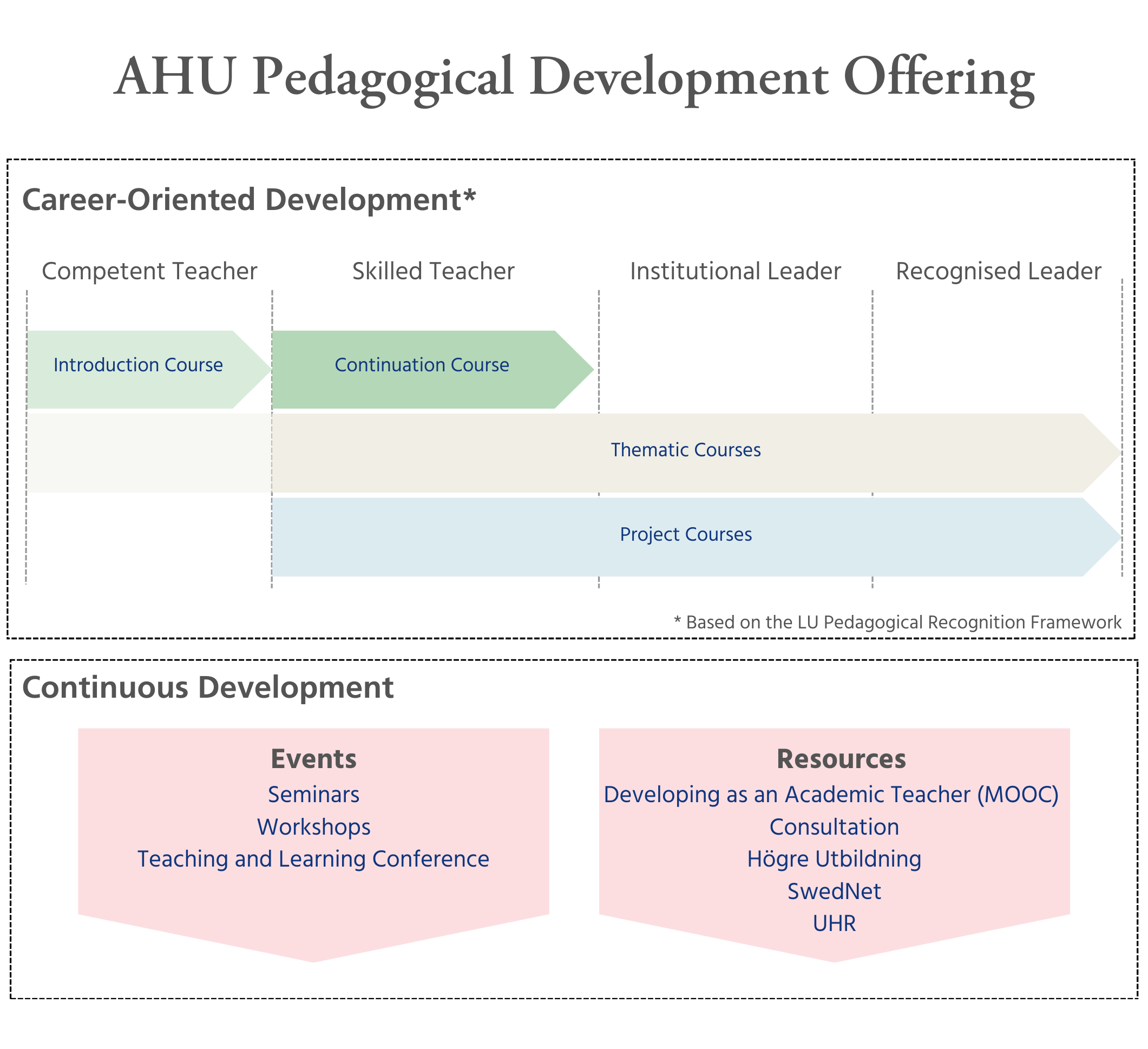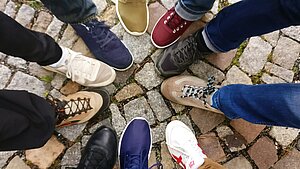Opportunities to Advance Pedagogical Competence
Considering your pedagogical competence development – from theory, planning, practice, observation – there are many opportunities available to advance your pedagogical competence at Lund University. The specific strategies you select shall align with your professional and personal ambitions, with support from your line manager, department, faculty, and relevant pedagogical support unit.
The Division of Higher Education Development (AHU) at Lund University provides numerous opportunities to advance your pedagogical competence development. We structure our activities based on the intensity and scope of your engagement:
- Workshops, seminars, and lectures
- Pedagogical course (i.e. courses on teaching and learning in higher education)
- Scholarship of teaching and learning
- Consultation and collegial conversations

Workshops, Seminars, and Lectures
Our events take many forms – workshops, seminars, or lectures – which signal the amount of preparation or engagement. We offer a range of recurring workshops with specific focus areas, for example, designing teaching and learning activities, oral assessment, and teaching for sustainability. In addition, we invite speakers – from within the University and around the world – to provide thematic lectures. If interested, we can also design seminars for colleagues at your department or faculty.
View our upcoming events – ahu.lu.se
Pedagogical Courses
Our courses are designed to be authentic, interactive, and reflective, grounded in relevant pedagogical literature and theory. They concern participants’ own teaching and teaching context. Course content and curriculum is built upon the recommendations provided by the Association of Swedish Higher Education (SUHF). Our courses are offered in both English and Swedish taking pace in the classroom, online, or blended. In general, Lund University requires at least five weeks of pedagogical courses for a teaching position.
View our upcoming courses – ahu.lu.se
We offer four types of courses:
Introduction Course
This course provides an essential foundation in pedagogical principles and practices within the Swedish higher education context, catering to new teachers across the University. This course is equivalent to two weeks of pedagogical development.
Continuation Course
This course is an advance-level pedagogical course for those having completed the Introduction course, specifically focusing on advancing participants' knowledge, skills, and understanding pertaining to effective, student-centered course design. Those taking this course often have overall course responsibility. This course is equivalent to three weeks of pedagogical development.
Thematic Courses
We offer several thematic courses, where course participants advance or reinforce their pedagogical competence. Not all courses are offered every semester, though, we try to inform well in advance to support your planning. These courses are generally equivalent to one to three weeks.
Project Courses
We regularly offer two project courses, where course participants can choose to conduct an individual or group project equivalent to one week or three weeks of pedagogical development, depending on the scale or scope of their project. Projects shall explore significant pedagogical challenges or opportunities that support student learning, using a scholarly approach. Projects are planned and executed by the participant, with support from a facilitator.
Scholarship of Teaching and Learning
Scholarship of teaching and learning (SoTL) is the systematic study of teaching practices and student learning aimed at improving educational outcomes. It often involves reflecting on, inquiring into, and refining one’s own teaching strategies, then sharing these insights to enhance teaching and learning experiences across disciplines.
Our coursework seeks to support this scholarly approach through the execution of course projects, including our project courses. Given your ambition, we can guide you to share this work locally, or to submit this work for publication in academic peer review journals
- Learn more about the journal Högre Utbildning – hogreutbildning.se
- Learn more about the journal Teaching and Learning Inquiry – ucalgary.ca
- Learn more about the journal Teaching in Higher Education – tandfonline.com
- Learn more about the International Journal for the Scholarship of Teaching and Learning – georgiasouthern.edu
In addition, you may wish to submit your SoTL research to the Lund University Teaching and Learning Conference or relevant faculty pedagogical inspiration conferences.
Lund University Teaching and Learning Conference (LUTL)
Lund University hosts a university-wide pedagogical development conference every two years. The conference is hosted by the Education Board and is a joint arrangement between the faculties and AHU. The conference provides an opportunity for teaching staff and students to share knowledge and experiences regarding teaching and learning at Lund University.
Learn more about the Lund University Teaching & Learning Conference – ahu.lu.se
Faculty Inspiration Conferences
Several faculties host pedagogical development conferences, usually on the years that the LUTL is not offered. These inspiration conferences allow for presentations and discussions about disciplinary-specific pedagogical approaches. Check with your faculty about the content and theme of any forthcoming conferences.
Consultation
In the face of global challenges and changing student needs and expectations, there may be questions or situations that require greater support. Our staff at AHU are prepared to receive questions or requests to support your own and your colleagues’ pedagogical development. For instance, we can plan specific seminars or workshops for your teaching team or department when you have specific needs or requests.
Collegial Conversations
While we offer many opportunities to advance your pedagogical development, the greatest opportunity are those friends and colleagues within your context. We encourage collegial discussions during fika, department or supervision meetings, development talks, etc. Perhaps it is within these existing and comfortable environments where you may receive meaningful support beyond what we are able to offer. These conversations are valuable and will influence your practice, so try to reflect on them when you are adding to your portfolio.



